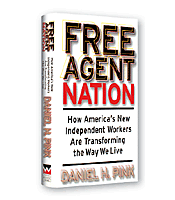 This article was originally published on December 7th, 2008. Time continues to show that Dan was right is pointing out the rise of the small business in our economy.
This article was originally published on December 7th, 2008. Time continues to show that Dan was right is pointing out the rise of the small business in our economy.
Over the past few months I have been developing the idea of what I call the “new entrepreneur”. This is someone who starts their own business, not because they have the entrepreneurial drive to start businesses, but rather because they provide a service and they prefer to work in an independent capacity. Some of them might not even have a choice, as corporations downsize and contract out much of their work.
Upon hearing about my idea, my friend Betsy recommended that I pick up Daniel Pink’s Free Agent Nation. Daniel had examined the process of more and more people leaving the employ of large corporations and going out on their own. He calls these individuals “free agents” because they are free to work on their own terms, and their experiences can vary from a temp working as a secretary to a graphic designer running their own media company. Many of these individuals fall into my description of the new entrepreneur.
Daniel points out 4 factors that have helped shift many people into free agency during the end of the twentieth and the beginning of the twenty-first century:
- The social contract of work (security for loyalty) crumbled .
- The means of production were democratized (cf. The Long Tail).
- Prosperity allowed people to work for meaning, not just money.
- The half-life of organizations shrunk.
What this has really done is changed many work relationships from vertical (working in a hierarchical corporation) to horizontal (working with equal partners to accomplish specific objectives). And with the continuing changes in the American economy, I think that this pattern will become more prevalent in the near future.
Big Thought
The fundamental composition of the work structure in the United States is shifting from corporate employment to independent work. While not everyone is making this shift, it is having a huge effect on the way that people live their daily lives and interact with each other.
Ideas, Implications, and Questions
- One thing that stood out strongly was the free agent org chart. It’s something that I’ve been seeing in my business and my clients’ businesses over the past few years. It involves a revolving set of business relationships that coalesce over individual projects. It reinforces that one of the most important components to success as a free agent is the strength of a person’s network. The network creates opportunities for referral business, but more importantly it creates connections to the “partners” that can help the free agent complete a project.
- Daniel makes me feel good about my career choice by pointing out the importance of coaches in a work/life structure that’s very fluid and exposes individuals to a lot more risk (no more hiding behind a veil of corporate security). As he says: “In a sense, coaches are shrinks without the couches, management consultants without the flow charts, and sympathetic bartenders without the shot glasses” (pg 181).
- Did you know that the American system of tying health insurance to your job is an historical accident, and doesn’t have logical precedent (the US is the only Western country that does this)? It keeps a lot of people tied to jobs they’re not happy with and are unproductive in. Another reason for health care reform!
- The idea of blending vs. balancing is very powerful and gives me a great way to talk to my clients about how to manage their time when they are working on their own. I’ve seen it a lot already, where a person will work in spurts throughout the day to include family responsibilities. For example, they create their work schedule so they can take their kids to school and pick them up in the afternoon. I think that looking at the process as blending is a lot less stressful than trying to create balance. The idea of creating balance seems to stress people out more because they think they have to work at it (and their afraid they’ll fall out of balance).
Should you read this book?
I think this is a fun read for someone who is a free agent, or for someone in corporate HR who is wondering how to work with the ever-increasing population of free agents. Daniel does a bit of predicting, which even in the 5 years since Free Agent Nation was written has been pretty off. Besides that, though, he provides a great snapshot of the dynamic process of economic evolution in the U.S. in the last twenty years.
